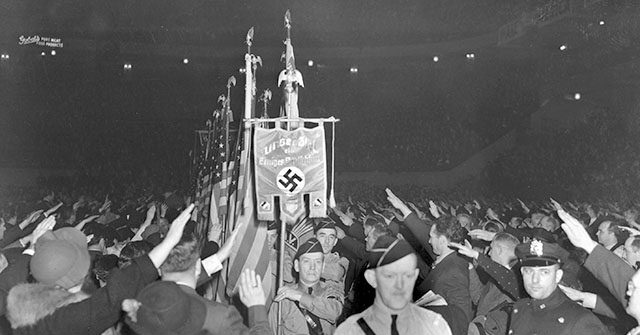MSNBC faced severe criticism after airing historical footage from a pro-Nazi rally in 1939 while covering a recent rally held by former President Donald Trump at Madison Square Garden. During the broadcast, an MSNBC anchor drew a controversial parallel between Trump and Adolf Hitler, describing the event as “particularly chilling” and recalling the antisemitic rhetoric from nearly a century ago. With phrases like “more than 20,000 supporters of a different fascist leader,” the network aired segments that juxtaposed the Trump rally with disturbing images and anecdotes from the historic pro-Nazi rally. This comparison sparked widespread outrage across social media, with many viewers asserting that the network’s coverage was a malicious misrepresentation.
Critics of MSNBC quickly took to platforms like X (formerly Twitter) to express their outrage, labeling the network’s actions as a “sickening lie and smear.” Some individuals highlighted that part of the rally attendees were Holocaust survivors who support Trump, emphasizing that the modern gathering was in stark contrast to the hateful events of the past. New York City Councilwoman Inna Vernikov, who attended the rally, pointed out that the spirit of unity and love among attendees was mischaracterized by MSNBC’s coverage. She expressed the sentiment that the rally included people of diverse races and religions, all united in the desire to improve the country.
The backlash against MSNBC quickly gained momentum, with prominent public figures and everyday users expressing their frustration over the network’s portrayal of the Trump rally. News contributors and political figures condemned the report, describing it as not just inaccurate but harmful misinformation. Comments such as “Shame on these liars” and calls for boycotts and lawsuits against MSNBC surfaced, as many felt the comparisons could incite violence against Trump supporters. The general consensus among critics was that the network’s actions contributed to a culture of aggression against individuals attending the rally, raising concerns about media responsibility and ethics.
Elon Musk and other public figures joined in the criticism, labeling MSNBC’s behavior as “utter scum,” and expressing disbelief at the network’s extreme stance. Others echoed sentiments that highlighted a broader issue regarding trust in mainstream media, asserting that the comparison to historic fascism and violence was not only unfounded but a dangerous narrative. Journalists, politicians, and commentators pointed to the diversity visible at the Trump rally – with participants from various backgrounds actively engaging in the event – as evidence contradicting MSNBC’s claims.
Satirical and humorous takes on the situation also emerged, with outlets like The Babylon Bee mocking the absurdity of the comparisons made by MSNBC. Some X users articulated the fear that the network’s rhetoric could lead to actual physical threats against Trump, declaring that the media’s actions crossed a dangerous line. Their assertions highlighted a growing divide regarding media reporting and the portrayal of political gatherings, reflecting a profound distrust in how narratives are crafted to suit specific agendas.
In summary, MSNBC’s decision to air clips of a 1939 pro-Nazi rally to criticize Trump’s Madison Square Garden event sparked a significant backlash, prompting questions about media ethics and the responsibilities of news networks. Critics maintained that the juxtaposition of the events was not only factually misleading but also inflammatory, risking escalation of violence against rally participants. The ensuing uproar illustrates the current charged political landscape, where media narratives are scrutinized and challenged, reflecting deep divisions in public perception of events and the figures involved.

